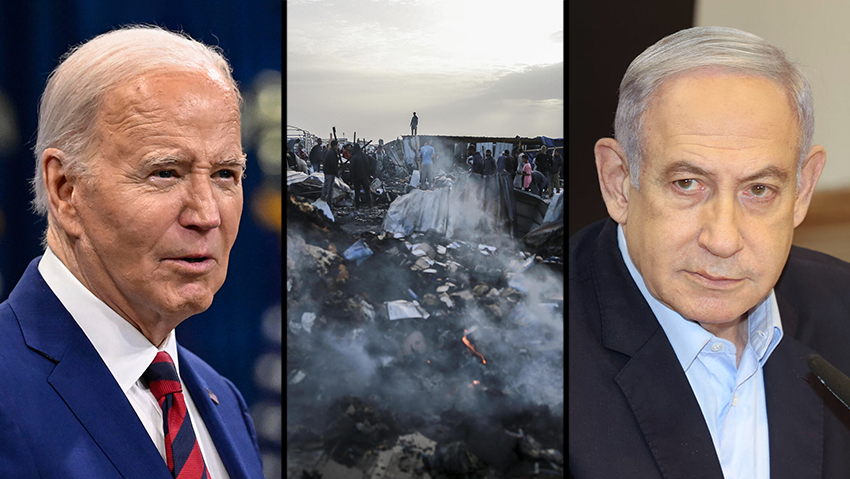Getting your Trinity Audio player ready...
Israel overhauled its military operations in Rafah following intensive discussion with American officials to avoid crossing the "red line" set by the Biden administration in order to avoid provoking a crisis in relations with its closes ally, the Wall Street Journal reported Sunday, citing U.S. and Israeli officials.
According to the report, Israel shelved its original plan, which included a raid by two divisions in the southern city. The White House feared that such an operation would lead to an escalation of the conflict and a significant increase in the number of dead Gazans. Instead, Israel has opted for a military campaign that focuses on the border between Gaza and Egypt and on a more limited activity in Rafah.
1 View gallery


Israel under Benjamin Netanyahu shelved its Rafah military plans in order to avoid crossing US President Joe Biden's 'red lines'
(Photos: Jehad Alshrafi/AP, Yariv Katz, Matt Kelley/AP)
The change in focus makes it possible, among other things, to avoid sanctions that the United States might have imposed, including the proposed ban on the use of American weapons in any activity in Rafah. Despite this, American and Western officials stated that no practical plan had been drawn up to evacuate the residents who fled Rafah following warnings and attacks by the IDF, including the incident in which dozens of Palestinian civilians were killed in a fire in a displaced persons camp after an attack that targeted two Hamas leaders from the West Bank.
The Hamas government in the city announced at the time that 45 people had died in the fire, and the Gaza Ministry of Health, which is under the control of the terrorist organization, said that at least 23 of the dead were children, adults or women. The findings of the initial investigation carried out by the IDF revealed that a kilometer separated the safe zone designated for the displaced from the point of attack, and that the Air Force used weapons that were not supposed to set fire to the tent complex.
Despite this, the world expressed shock and condemned the attack. In the United States, they initially refrained from commenting, but the White House eventually published its response and said that the photos were "heartbreaking."
A spokesman for the National Security Council of the United States told Ynet that "Israel must take all possible precautions to protect citizens. We are actively urging the IDF and partners in the field to act to assess what happened, and we understand that the IDF is conducting an investigation."
The Wall Street Journal noted that, despite his support for Israel, Biden is working to end the war and promote a cease-fire. On Friday, the president revealed in his speech a proposal for a hostage deal , which he claims was drawn up by Israel.
US President Joe Biden presents Israel's plan to end the war in Gaza on May 31, 2024
(Video: Reuters)
The first phase, lasting six weeks, would include "a full and complete cease-fire, the withdrawal of Israeli forces from all populated areas in Gaza, the release of several hostages including women, the elderly and injured, in exchange for the release of hundreds of Palestinian prisoners."
Palestinians will be allowed to return to "their homes and neighborhoods," including in northern Gaza, and humanitarian aid will be increased to 600 trucks entering the area daily, with temporary housing and shelters provided. This phase will be accompanied by negotiations between Israel and Hamas to achieve a permanent cease-fire.
The second phase, which will also last for six weeks, will include the release of "all remaining living hostages," including IDF soldiers. If the parties continue to meet the conditions, the cease-fire will become permanent.
Following this, the third phase would involve the reconstruction of Gaza with the support of the United States and the international community. Biden said he would work with regional partners to prevent Hamas from "rearming itself."




